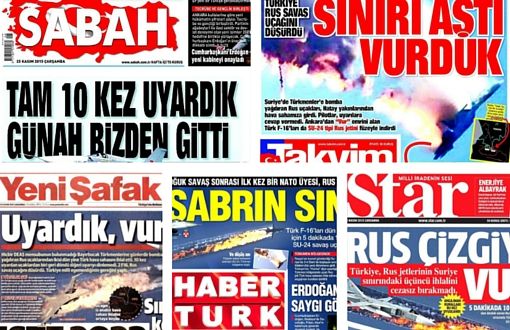This article was written on pro-war stance of Turkish media upon Assembly’s approval of the resolution which was granting parliament authority for cross-border operation into Syria on October 4, 2012. During those days, majority of the media captioned such as “We cannoned Syria; We hit it”, “They want us to battle”, “Not left unreciprocated”, “Prepare for war if you seek peace”, “Not a bluff”, “We’ve immediately retaliated”.
Three years have passed since then, there headlines such as “We warned 10 times, the gauntlet has been thrown” (Sabah), “Warned and hit” (Yeni Şafak), “End of our rope” (Habertürk), “Russia has crossed the line and we hit” (Star), “[Russia] Transgressed border and we hit” (Akşam), “We shot down” (Milat) used following Turkish Armed Forces (TSK) shooting down Russian warplane over border violation.
In short, nothing has changed, whatever written in 2012 are still applying to today.
* * *
History hasn’t witnessed a war which was ended by media. As in the U.S. that lived Vietnam hell, mainstream media sometimes provided support in ending fierce conflicts which were thought “would be best” to be ended, that’s all. However, the number of wars media started or at least molded sufficient public opinion to start it is so large that one cannot help but ask “why does mainstream media do that?”In order to give a correct answer to this question, we need to remind what “mainstream” is. Dictionaries define this concept as “the ideas, attitudes, or activities that are shared by most people and regarded as normal or conventional”. As for media, this “normal” reflects on websites and channels as discourse of a grand group believing it culturally represents values of society, tries to place itself in the center of political spectrum, and claims to address majority. Mainstream, in other words “widespread” media, is actually pursuing a holistic dream that belongs to the “nation” it actually addresses while it is fulfilling its role of prevalence. Popularity concern produces the discourse of hegemonic and majority subjects over and over. Those who are opted out this majority are being redefined as “radical”, “marginal”, “abnormal”.
Average human judgement
This concern of redefining and placing itself spring to life as intolerance against different ones. This is in general manner the biggest problem that leads aggressive nationalism, militarism, discrimination and hate speech to take place on media. On the other hand, mainstream media coming to a deadlock in its effort to become the voice of majority which it believes to represent generates a stereotype of “average human”. Claim of being “voice of people” in fact turns into a unilateral and wrong communication that comes to say “We are setting the agenda for you, staying up to date and tell the things required on your behalf”.
British academic Michael Billig, in his book “Banal Nationalism” reminds that we need to mind more daily nationalistic judgements, presuppositions, and definitions without denying the significance of aggressive and militarist language which emerge during crisis periods. It is possible to see “us vs. them” dichotomy through Billig’s rightful determination especially on mainstream media in aforementioned headlines. This dichotomy causes on media to be spoken in Turkey’s name in crisis periods, and sometimes even cause to be more “us” than society and government. It would be correct to see this situation as first motivation of pro-war stance of mainstream media.
Peace is priceless
The second factor lies in media’s political economy structure. The proposition taught by Anglo-Saxon journalism of which American William Randolph Hearst is a representative as well, who is maybe the most famous media boss and find no harm in pick war just to make his media outlets more important and salable, is unfortunately valid: “The real news is, bad news”.
It is true that mainstream media loves crisis. The crisis periods are when the mainstream media is most taken seriously. Thus, a possible Turkish-Syrian war means hundreds of articles, opinion pieces, and maybe hundreds of thousands of more copies. Besides, major conflicts provide golden opportunities for the media organ to undertake the role quickly which it tries to get in political conjecture. However, peace is valuable too in every sense and a realistic hope unlike common belief. It is at least worth to try because there is no cost to pay in state of peace. Today we know it has been long since “impartiality” buried in the history of media. We don’t expect anyone to be “impartial”. We realize that more realistic, more meaningful concepts should be replaced with impartiality. Nevertheless, the gap caused by lack of “impartiality” is unfortunately almost never filled with “pro-peace”. (HÇ/HK/TK)
Click here to read the article in Turkish





